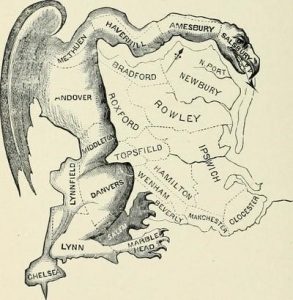In this blog post, Andrew Goodman Foundation Fellow Katelyn Winstead explains gerrymandering and its effects on elections. She also shares the story of a UM alum who played a key role in addressing gerrymandering in Mississippi.
Gerrymandering: What is it and Why is it Harmful to Voters?
Following the 2020 Presidential election, the United States has stimulated tons of discussion across the nation about voting- whether the system is corrupt, whether people need easier access to voting, and everything in between. There is, however, one process that is invariably unfair, undemocratic, and hurts our voters across all states, counties, and jurisdictions: gerrymandering.
What is gerrymandering?
The definition of gerrymandering, according to the Oxford Dictionary, is “To manipulate the boundaries of an electoral constituency so as to favor one party or class.”
The term gerrymandering gets its name from Elbridge Gerry, who was the governor of Massachusetts in 1812. While in office, Gerry signed a bill allowing his party to draw district lines that would favor them and weaken the Federalist party. Looking at the map, the district resembled the outline of a salamander; a Boston Editorial cartoonist drew it with a head and claws and termed it the “Gerrymander”.

Source: Hawaii Public Radio
The Effects of Gerrymandering in the United States
Although both parties tend to point fingers at each other, the truth of the matter is that both Democrats and Republicans are guilty of gerrymandering across the nation. Most political scientists concur that the most notable states that are politically slanted in the way their districts are drawn are: Texas, North Carolina, Michigan, Ohio, Illinois, Maryland, Wisconsin, and California.
The effects of gerrymandering on voters’ rights are detrimental. The whole process seeks to silence the voices of party rivals and amplify those of supporters- something that is all too prevalent in politics and not only confuses voters, but also basically invalidates their vote. Gerrymandering essentially punishes voters for sticking to one party, and if they are not within the party that draws the districts, then they are unlikely to be acknowledged in the voting or political atmosphere.
The problem of gerrymandering has been brought to the Supreme Court’s attention plenty of times in the past century; however, besides cases of outright racial gerrymandering, the Justices have declined to rule decisions in cases pertaining to partisan gerrymandering. Justice John G. Roberts Jr. wrote the most recent majority opinion of the Court in 2019, stating that in order to rule partisan gerrymandering unconstitutional, the Court would require a limited and precise standard, which neither parties had demonstrated. Justice Roberts went on to say that Congress and the States hold the power to address partisan gerrymandering, but that it is out of the Court’s reach.
Many states have begun to address the issue of gerrymandering by appointing independent redistricting commissions, which use computer software to accurately define district lines without the burdens of political ideologies. In order to properly address the issue of gerrymandering, the use of independent redistricting commissions could be one of the strongest contenders.
Gerrymandering in Mississippi
In May of 2017, John Chappell, a then-sophomore student at the University of Mississippi, identified Senate District 22 on a map; District 22 was comprised of zigzagged lines, spanning 120 miles south from the Delta to the Jackson suburbs. Chappell began noting demographics of voters in this particular district and realized that there was something very wrong: the African American population was severely underrepresented relative to the immediate areas on the other side of the District 22 borderline. The zigzag lines were drawn to clearly favor the votes of white constituents within District 22.

John Chappell redistricting map
After two nights of research and redrawing lines, Chappell drew up his own map of Mississippi with fairly drawn districting lines and sent his findings to the Mississippi Center for Justice. Soon after, a lawsuit was sent to federal courts.
Judge Carlton Reeves ruled that Senate District 22 had violated the Voting Rights Act and the 5th Circuit Court of Appeals upheld; lines were to be redrawn by April 3, 2019. The new districting plan would increase the African American voting age population in District 22 from 50.77% to 58.13%.
This story of the discovery of gerrymandering by a sophomore undergraduate student shows just how much the unfair and undemocratic practice can affect the political landscape of a state; John Chappell was well ahead of his time and an inspiration for those of us that dream of political and social justice. Although Mississippi was lucky to have John Chappell at just the right time, there must be actions that will address future attempts of gerrymandering. Employing an independent redistricting commission can ultimately lead to fairly drawn district lines in which every voters’ voice matters and is not silenced by unfair and undemocratic political rivalry.
Sources:
For your reference:




 Hello! My name is Katelyn Winstead, and I am a junior transfer student from Ocean Springs, MS. I am in the process of completing a double major in public policy leadership and philosophy, and I am also a Sally McDonnell Barksdale Honors Scholar. After I complete my undergrad, I plan on enrolling in a dual Public Policy and Juris Doctorate program in the hopes of continuing on to a career in the areas of law and public policy.
Hello! My name is Katelyn Winstead, and I am a junior transfer student from Ocean Springs, MS. I am in the process of completing a double major in public policy leadership and philosophy, and I am also a Sally McDonnell Barksdale Honors Scholar. After I complete my undergrad, I plan on enrolling in a dual Public Policy and Juris Doctorate program in the hopes of continuing on to a career in the areas of law and public policy.

